
Molds & Accessories
Cylindrical Press Mold with Scale for Lab
Item Number : PCMC
Price varies based on specs and customizations
- Die heating
- Alloy tool steel :Cr12MoV
- Indenter hardness
- HRC60-HRC62
- Sample size
- Φ10、Φ12、Φ13、Φ15、Φ18、Φ20 mm (M)
- Cavity depth
- 100mm (N)
- Dimensions
- Φ53*220mm(L*H)
Shipping:
Contact us to get shipping details Enjoy On-time Dispatch Guarantee.
Why Choose Us
Easy ordering process, quality products, and dedicated support for your business success.
Introduction
The cylindrical press mold with scale is a versatile tool designed for high-pressure molding of powders into various shapes and sizes, including round, square, and hexagonal forms. It features electric heating for precise temperature control during the molding process. This mold is particularly useful for applications requiring large cross-sectional areas or high pressure, such as the production of spark plugs and other industrial components. The system includes an automatic press control device for setting multiple pressure regulation steps, ensuring repeatable and stable results.
Applications
Cylindrical press molds with scale application are versatile tools used in various industries for creating precise and uniform shapes from powders or granules. These molds are particularly useful in scenarios requiring high pressure and large cross-sectional areas, ensuring stability and uniformity in the final product. Below are some key application areas and related long-tail keywords:
-
Pharmaceutical Tablet Manufacturing:
- Tablet Compression Molding: Utilized for pressing powders into tablets of various shapes and sizes.
- Uniform Dosage Formulation: Ensures consistent drug distribution in each tablet.
-
Ceramic Product Production:
- Ceramic Tile Pressing: Forming ceramic tiles with precise dimensions and shapes.
- Advanced Ceramic Components: Manufacturing components for electronics and automotive industries.
-
Powder Metallurgy:
- Metal Powder Compaction: Creating metal parts with high density and strength.
- Custom Metal Shapes: Producing intricate metal shapes for specialized applications.
-
Food Industry:
- Confectionery Pressing: Forming candies and other food items into specific shapes.
- Nutritional Supplement Tablets: Ensuring uniform size and shape for easy consumption and dosing.
-
Research and Development:
- Material Science Experiments: Testing the properties of new materials under controlled pressure conditions.
- Prototype Development: Quickly producing samples for testing and validation.
These applications highlight the versatility and precision of cylindrical press molds, making them essential equipment in numerous industrial and research settings.
Detail & Parts
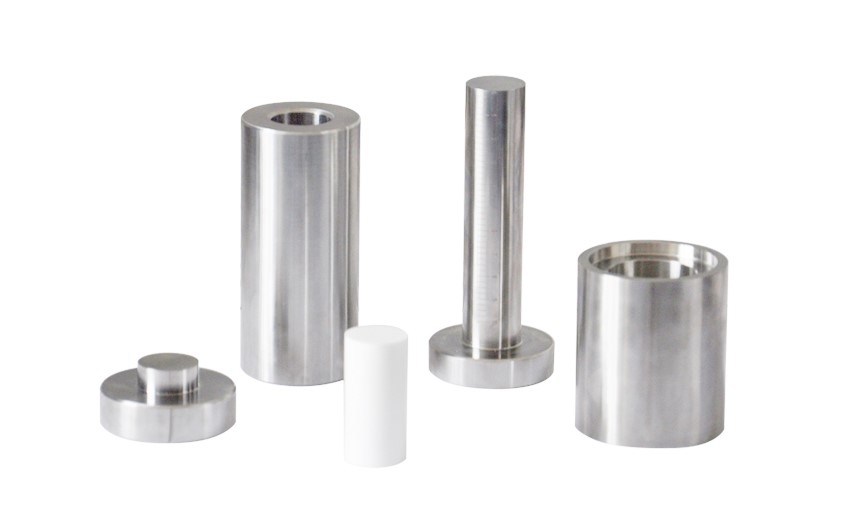

Technical specifications
| Instrument model | PCMC |
|---|---|
| Sample shape | 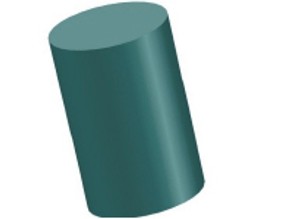 |
| Die heating | Alloy tool steel :Cr12MoV |
| Indenter hardness | HRC60-HRC62 |
| Sample size | Φ10、Φ12、Φ13、Φ15、Φ18、Φ20 mm (M) |
| Cavity depth | 100mm (N) |
| Dimensions | Φ53*220mm(L*H) |
| Weight | 4.8Kg |
| Diagram of hydraulic powder press size | 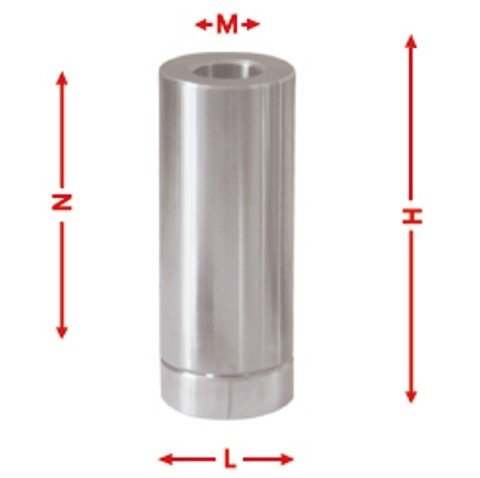 |
Operation steps

1.Assemble the die according to the operation diagram and install the sample in the cavity.

2.Put the die in the center of the hydraulic press and pressurize to required pressure.

3.Assemble the die according to the release diagram , eject the sample out of the die bushing with the screw rod.

4.Take out the die from the hydraulic press , and remove the sample gently.
Principle
The cylindrical press mold operates on Pascal's principle, which ensures uniform pressure distribution across the entire surface of the enclosed incompressible fluid. This principle is utilized in the molding process where powder materials are sealed in a low-deformation mold, typically a rubber bag, and subjected to uniform compression by transmitting liquid pressure. This method ensures stability and uniformity in the molded pieces, making it suitable for producing various shapes and sizes with high precision.
Advantages
-
Enhanced Stability and Uniformity: The cylindrical press mold ensures that samples are compacted uniformly from each side, leading to increased stability and uniformity. This is crucial for subsequent processing stages, especially in industries where precision is paramount.
-
Versatility in Shape and Size: With the ability to use different shapes of molds, this press can produce a variety of shapes and sizes, including round, square, rectangular, circular, hexagonal, and flat shapes. This versatility is essential for industries that require diverse product forms.
-
High Aspect Ratio Pellet Production: The mold's design allows for the pressing of very long aspect ratio pellets, which is particularly beneficial in industries like ceramics and spark plug manufacturing. This capability ensures that long, thin items can be pressed without compromising on quality or stability.
-
Repeatable Process: Once the initial setup is calibrated for specific dimensions, the process becomes highly repeatable. This is advantageous for mass production where consistency is key.
-
Electric Heating Capabilities: The inclusion of electric heating in the mold allows for the heating process to be integrated into the pressing stage. This feature streamlines the production process, reducing the need for separate heating equipment.
-
Large Tonnage Machine Compatibility: The mold is designed to work with large tonnage machines, making it suitable for high-pressure applications. This is essential for industries that require high force to mold large cross-sectional areas.
-
Energy Efficient Operation: The circuit principle and operational steps ensure efficient energy storage and release, contributing to a more energy-efficient operation. This is beneficial for reducing operational costs and environmental impact.
-
Suitable for Irregular Shapes: The mold can handle irregular shapes such as donuts or items with varying dimensions along their length. This flexibility is crucial for industries that produce complex-shaped products.
By leveraging these advantages, the cylindrical press mold offers a robust solution for industries requiring precise, versatile, and efficient pressing processes.
Trusted by Industry Leaders

FAQ
What Is A Press Mold?
What Is Press Mould In Ceramics?
How Are Pellet Molds Used?
What Types Of Materials Can Be Pelletized Using Pellet Molds?
How Can One Select The Appropriate Pellet Mold For Their Specific Application?
4.7 / 5
Impressive precision and durability, perfect for our lab's needs.
4.8 / 5
Fast delivery and excellent value for money, highly recommend!
4.9 / 5
Top-notch quality, simplifies our molding process significantly.
4.7 / 5
Technologically advanced, handles complex shapes with ease.
4.8 / 5
Durable and reliable, meets all our high-pressure needs.
4.9 / 5
Efficient and versatile, a game-changer for our lab.
4.7 / 5
Great customer service, product as described and more.
4.8 / 5
Consistently high performance, very satisfied.
4.9 / 5
Innovative design, simplifies our production process.
4.7 / 5
Robust and efficient, handles large tonnage with ease.
4.8 / 5
Excellent build quality, highly recommend for any lab.
REQUEST A QUOTE
Our professional team will reply to you within one business day. Please feel free to contact us!
Related Products
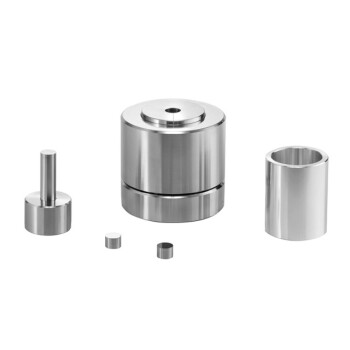
Assemble Lab Cylindrical Press Mold
Get reliable and precise molding with Assemble Lab Cylindrical Press Mold. Perfect for ultra-fine powder or delicate samples, widely used in material research and development.
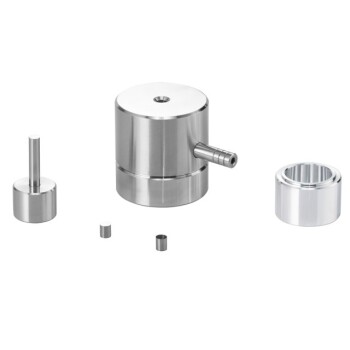
Cylindrical Press Mold for Lab Applications
Efficiently form and test most samples with Cylindrical Press Molds in a range of sizes. Made of Japanese high-speed steel, with long service life and customizable sizes.
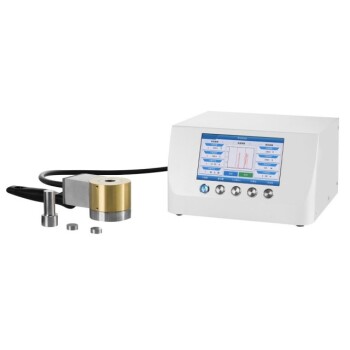
Cylindrical Lab Electric Heating Press Mold for Laboratory Applications
Efficiently prepare samples with Cylindrical Lab Electric Heating Press Mold. Fast heating, high temp & easy operation. Custom sizes available. Perfect for battery, ceramic & biochemical research.
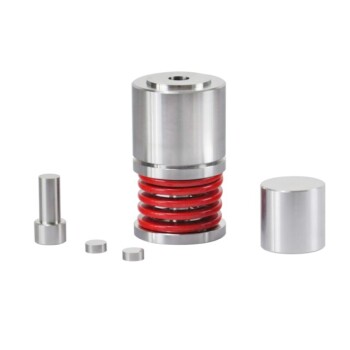
Round Bidirectional Press Mold for Lab
The round bidirectional press mold is a specialized tool used in high-pressure molding processes, particularly for creating intricate shapes from metal powders.
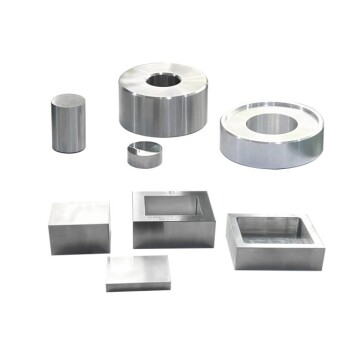
Special Heat Press Mold for Lab Use
Square, round and flat plate forming dies for hot presses.

Anti-Cracking Press Mold for Lab Use
The anti-cracking press mold is a specialized equipment designed for molding various shapes and sizes of film using high pressure and electric heating.
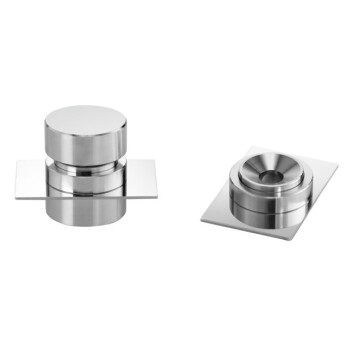
No Demolding Lab Infrared Press Mold for Laboratory Applications
Effortlessly test your samples with no demolding required using our lab infrared press mold. Enjoy high transmittance and customizable sizes for your convenience.

Hydraulic Diaphragm Lab Filter Press for Laboratory Filtration
Hydraulic diaphragm lab press filter is one type lab scale filter press, it takes small footprint, and higher pressing power.
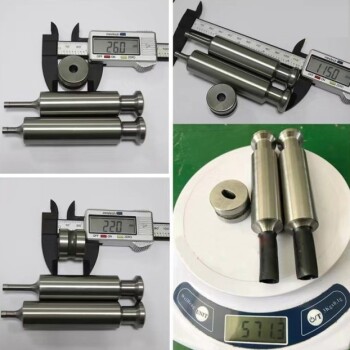
Multi-Punch Rotary Tablet Press Mold Ring for Rotating Oval and Square Molds
The multi-punch rotary tablet press mold stands as a pivotal component in pharmaceutical and manufacturing industries, revolutionizing the process of tablet production. This intricate mold system comprises multiple punches and dies arranged in a circular fashion, facilitating rapid and efficient tablet formation.
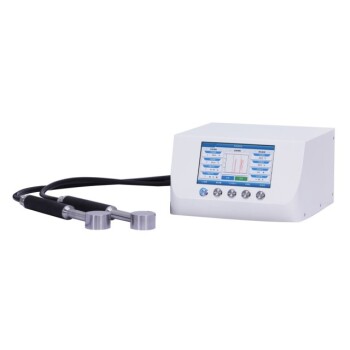
Infrared Heating Quantitative Flat Plate Press Mold
Discover advanced infrared heating solutions with high-density insulation and precise PID control for uniform thermal performance in various applications.
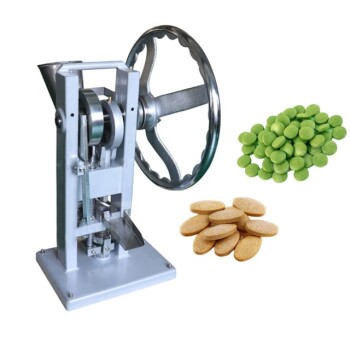
Single Punch Manual Tablet Press Machine TDP Tablet Punching Machine
Single punch manual tablet punching machine can press various granular, crystal or powdery raw materials with good fluidity into disc-shaped, cylindrical, spherical, convex, concave and other various geometric shapes (such as square, triangle, ellipse, capsule shape, etc.), and can also press products with text and patterns.
Related Articles

Comprehensive Guide to Cylindrical Lab Electric Heating Press Mold: Technology and Applications
Explore the advanced features and applications of cylindrical lab electric heating press molds. Learn about their working principles, types of heating technologies, and key benefits for precise sample preparation.

Comprehensive Guide to Metal Mold Pressing: Techniques, Equipment, and Applications
Explore the detailed process of metal mold pressing, including equipment, techniques, and applications. Learn how hydraulic presses shape materials like metal and rubber efficiently.

Infrared Press Mold Techniques for Non-Demolding Applications
Explore advanced infrared press mold techniques without demolding. Learn about the benefits, applications, and best practices for non-demolding lab processes.

Manual Pellet Press: A Comprehensive Guide to Efficient Lab Pelletizing
Explore the intricacies of manual pellet presses, including operation, safety, and maintenance tips. Learn how to choose the right press, understand force gauges, and optimize pellet quality for your lab experiments.

Optimizing Laboratory Analysis with Split Automatic Heated Lab Pellet Press
Explore the advanced features and benefits of split automatic heated lab pellet presses for precise pellet preparation in various analytical applications. Ideal for high-throughput laboratories.

Infrared Heating Quantitative Flat Plate Mold: Design, Applications, and Benefits
Explore the advanced design and applications of infrared heating quantitative flat plate molds. Learn about their benefits in achieving uniform heat distribution and efficient processing.

Hydraulic Tablet Press: Comprehensive Guide to Design, Operation, and Applications
Explore the advanced features, operational principles, and diverse applications of hydraulic tablet presses in various industries. Learn how these machines ensure high-quality tablet production with detailed insights.

Nine Precision Molding Processes of Zirconia Ceramics
An overview of nine advanced molding processes for zirconia ceramics, including dry and wet methods.

Issues with Poor Demoulding in Manual Tablet Presses
Analyzes the causes of poor demoulding in manual tablet presses, focusing on powder, mold, machine body, and operator factors.

Precision Ceramic Injection Molding: Key Processes
An in-depth look at the stages of precision ceramic injection molding, focusing on grouting, holding pressure, cooling, and demolding.

Advanced Ceramics Hot Press Sintering Technology and Equipment
Explores the hot press sintering process for advanced ceramics, its methods, advantages, equipment, and applications.

Fused Silica Crucible: Properties, Applications, and Preparation Process
An in-depth look at the properties, applications, and preparation methods of fused silica crucibles in the solar photovoltaic industry.